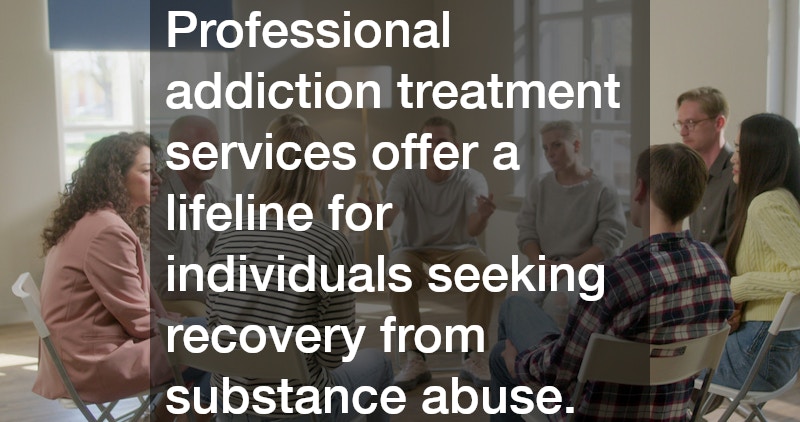The modern world is grappling with an escalating crisis: addiction. Substance abuse doesn’t discriminate—it affects people from all walks of life, breaking families and shattering dreams along the way. For those caught in its grip, professional addiction treatment services offer a beacon of hope, presenting a well-structured and scientifically-backed route to recovery.
Why Choose Professional Treatment Over Self-Recovery?
Comprehensive Care
Professional treatment centers offer a holistic approach to healing, addressing addiction’s multifaceted nature. Unlike self-recovery, these centers integrate physical health assessments, mental health support, and even nutritional guidance into their programs.
This multidimensional approach ensures that individuals receive in-depth care, reducing the likelihood of relapse and promoting sustained recovery.
With tailored treatment plans, professional facilities address the root causes of addiction, which often include psychological and emotional triggers. Such comprehensive care often involves therapy sessions that unravel underlying mental health issues like depression and anxiety. By addressing these deeper issues, facilities help clients develop healthier coping mechanisms, paving the way for long-term sobriety.
Furthermore, professional treatment centers emphasize long-lasting change rather than temporary fixes. They design programs that equip individuals with the skills necessary to manage their lives post-recovery. As such, clients leave with enhanced self-confidence and an empowered sense of control over their futures.
Structured Environment
A structured environment is one of the hallmarks of professional addiction treatment facilities. It provides a safe and controlled setting, minimizing potential triggers that patients might encounter in their usual surroundings. This intense focus on routine promotes discipline and stability, creating an environment conducive to recovery.
The structure also helps to establish accountability, as individuals are held to their commitments within the program. Regular schedules, group activities, and personal responsibilities encourage personal growth and mutual support. This accountability fosters resilience and strengthens the individual’s commitment to their recovery journey.
Moreover, the support network created within these structured environments is invaluable. Peer support groups and therapy sessions provide a platform for patients to connect with others facing similar struggles. This camaraderie often becomes a critical component of maintaining long-term sobriety, offering encouragement and understanding from those who truly empathize.
Access to Expert Resources
In professional treatment settings, individuals benefit from the expertise of experienced medical and therapeutic professionals. These experts are equipped to offer personalized care, tailoring treatment plans to suit the unique needs of each patient. These customized approaches are more effective than generalized self-recovery methods.
Access to expert resources also means that patients receive high-quality medical care that can manage withdrawal symptoms safely. Around-the-clock monitoring ensures that individuals receive the medical attention needed during the critical stages of detox. This level of care is crucial for preventing complications and promoting a more comfortable, successful withdrawal process.
The therapeutic resources available in professional settings go beyond individual counseling. Group therapy and family counseling sessions are integral parts of treatment, helping not only to heal the person struggling with addiction but also to mend relationships that have been impacted. These resources provide a comprehensive support system that promotes healing on multiple fronts.
How Do Professional Treatments Improve Long-term Recovery Success?
Evidence-Based Therapies
Professional addiction treatment facilities utilize evidence-based therapies such as Cognitive Behavioral Therapy (CBT) and Dialectical Behavioral Therapy (DBT). These scientifically validated methods have been proven to enhance recovery outcomes by addressing thought patterns and behavioral issues linked with addiction. Such therapies empower individuals to change their thinking and behaviors, crucial for preventing relapse.
Additionally, these therapies help patients develop effective coping strategies to manage stress and triggers. By learning new ways to handle emotions and situations, individuals can achieve greater control over their reactions. This proactive approach ensures that patients are better prepared for life outside of treatment, reducing the risk of returning to substance use.
The incorporation of family therapy within evidence-based practices also plays a significant role in long-term success. It provides a space for families to heal and understand each other’s roles in the recovery process. Strengthening these family ties can offer an additional layer of support that continues long after formal treatment concludes.
Aftercare and Ongoing Support
The journey to sobriety doesn’t end once an individual completes a treatment program; aftercare is a vital aspect of sustained recovery. Professional addiction treatment services often incorporate aftercare plans that may include regular therapy sessions, support groups, and continued medical supervision. These resources help individuals maintain focus and commitment to their recovery journey.
Ongoing support provides a safety net to help patients navigate the challenges of reintegration into daily life. It reinforces the skills and strategies learned during treatment, ensuring individuals do not feel isolated or unsupported. Such continuous engagement significantly reduces the chances of relapse, fostering confidence and long-term healing.
Relapse Prevention Strategies
Learning effective relapse prevention strategies is an indispensable part of professional treatment programs. These strategies focus on recognizing triggers, developing coping mechanisms, and creating structured life plans that promote healthy choices. The guidance provided helps individuals anticipate challenges and develop individualized approaches to overcome them.
These techniques often include stress management, communication skills, and decision-making processes that help hundreds of people worldwide in daily recovery scenarios. By empowering individuals with these skills, professional treatments position them for success even post-treatment. Each patient becomes his or her own best advocate, crafting a life that supports ongoing sobriety.
Ultimately, relapse prevention extends beyond the individual, involving family support systems and broader community resources. Programs often involve family members in education and recovery, ensuring they can provide effective support. This collaborative approach builds a resilient foundation for a substance-free future, making professional addiction treatment services a critical investment in long-term health and wellbeing.
Professional addiction treatment services offer a vital lifeline for individuals seeking lasting recovery from substance abuse. Through comprehensive care, structured environments, access to expert resources, and a focus on long-term recovery success, they provide the tools and support needed to overcome addiction. By choosing professional treatment, individuals invest in a future that prioritizes health, well-being, and lasting sobriety, paving the way for a brighter, substance-free tomorrow.



